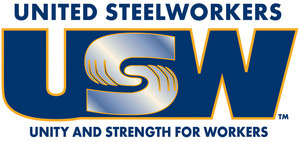BEAUMONT, Texas, Sept. 28, 2011 /PRNewswire-USNewswire/ -- Three hundred United Steelworkers (USW) delegates from the oil sector met last week in Dallas to form, debate and adopt the National Oil Bargaining Policy (NOBP) for 2012 negotiations.
(Logo: http://photos.prnewswire.com/prnh/20080131/DC12982LOGO)
Under the National Oil Bargaining process USW oil units have 45 days to present the program to their members and have them vote on it. A vote for the policy authorizes USW International Vice President Gary Beevers, who heads the union's oil sector, to call for a strike nationally or at specific locations.
Once ratified by 75 percent of the oil units, the NOBP becomes the policy and agenda for 2012 negotiations, which begin in January. Local negotiations happen at the same time as national bargaining.
The policy covers wage, benefit, health and safety, and other language proposals. Details of the ratified policy will not be available until all the ratification votes are taken.
Process safety will be the main issue during this round of National Oil Bargaining. Process safety refers to the engineering and management controls in place to prevent catastrophic events involving highly hazardous materials, such as explosions, fires and toxic releases.
"The oil industry continues to be a highly hazardous place to work," said USW International President Leo W. Gerard. "Voluntary efforts to improve process safety are not enough. The number of refinery fires continues to concern us."
Since Feb. 1, 2009 — the start of the current pattern agreement — through Sept. 2, 2011 there have been 131 reported refinery fires, according to the Department of Energy website. This amounts to at least one refinery fire a week. In 2009, there were 44 reported fires since Feb. 1, 2009; in 2010, 53 reported fires. This year there have been 34 fires through Sept. 2, 2011 that we know of. Since Feb. 1, 2009 refinery worker deaths have numbered 18.
"We must have meaningful and enforceable safety provisions if we are going to save lives, and we are prepared to strike, if necessary, to get that," said USW International Vice President Gary Beevers, who heads the union's oil bargaining program.
"We think a fight is senseless, extremely unnecessary and it'll hurt everybody involved. All it would take to avoid a strike would be for the industry to say, "Yes, we agree with you about the seriousness of this situation. We want to partner with you to make these facilities safer,"' Beevers said.
"I've been to a lot of memorial services in my career, but I've never been to one for a CEO," he added.
The National Oil Bargaining pattern agreement expires Feb. 1 at 12:01 a.m.
The USW represents 30,000 workers at 168 production, refining, marketing, transportation, pipeline and petrochemical facilities nationwide, including 69 refineries representing approximately 64 percent of U.S. refining capacity.
Overall, the USW is the largest industrial union in North America and has 850,000 members in the U.S., Canada, and the Caribbean. It represents workers employed in metals, rubber, chemicals, paper, oil refining, atomic energy and the service sector.
Click here to view the video "Still Out of Control" (http://bcove.me/rbia7v45)
Contact:
Lynne Baker, o) 615-831-6782, c) 615-828-6169
SOURCE United Steelworkers (USW)
WANT YOUR COMPANY'S NEWS FEATURED ON PRNEWSWIRE.COM?
Newsrooms &
Influencers
Digital Media
Outlets
Journalists
Opted In




Share this article